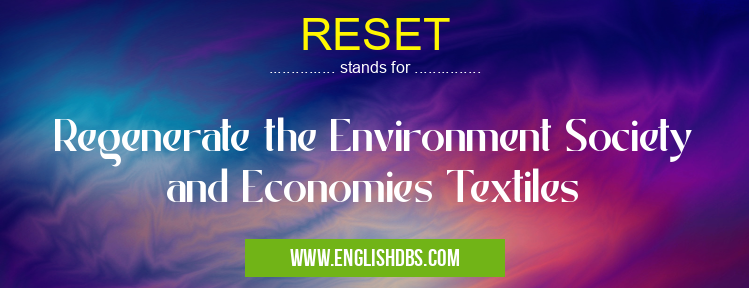What does RESET mean in SOCIETIES
RESET is an acronym that stands for Regenerate the Environment, Society, and Economies through Textiles. It represents a comprehensive approach to addressing sustainability challenges in the textile industry.

RESET meaning in Societies in Academic & Science
RESET mostly used in an acronym Societies in Category Academic & Science that means Regenerate the Environment Society and Economies Textiles
Shorthand: RESET,
Full Form: Regenerate the Environment Society and Economies Textiles
For more information of "Regenerate the Environment Society and Economies Textiles", see the section below.
What does RESET stand for?
RESET involves the following key areas:
-
Environment: Focusing on minimizing environmental impact, such as reducing waste, water consumption, and carbon emissions.
-
Society: Promoting fair labor practices, social justice, and community involvement.
-
Economies: Supporting sustainable business models, circular economy approaches, and economic inclusion.
-
Textiles: Emphasizing the use of sustainable materials, innovative technologies, and responsible design practices.
RESET's Goals
RESET aims to transform the textile industry by:
-
Reducing waste: Promoting circularity, recycling, and upcycling to minimize textile waste.
-
Conserving resources: Reducing water and energy consumption throughout the supply chain.
-
Protecting the environment: Minimizing air and water pollution, and promoting biodiversity conservation.
-
Empowering workers: Ensuring fair wages, safe working conditions, and access to education.
-
Supporting communities: Investing in local communities, creating job opportunities, and promoting social responsibility.
-
Driving economic growth: Fostering innovation, sustainable business practices, and circular economy models.
Essential Questions and Answers on Regenerate the Environment Society and Economies Textiles in "SCIENCE»SOCIETIES"
What is RESET?
RESET (Regenerate the Environment Society and Economies Textiles) is a comprehensive framework that guides organizations towards sustainable textile practices. It encompasses environmental, social, and economic considerations to promote positive change throughout the textile industry.
What are the key principles of RESET?
RESET is based on four key principles:
- Regenerate by restoring natural resources and reducing waste.
- Embed by integrating sustainability into every aspect of operations.
- Share by collaborating and exchanging knowledge.
- Transform by driving systemic change and innovation.
How does RESET benefit organizations?
RESET provides numerous benefits to organizations, including:
- Reduced environmental impact and improved resource efficiency.
- Enhanced brand reputation and consumer trust.
- Increased innovation and competitiveness.
- Improved employee engagement and motivation.
- Mitigation of supply chain risks and vulnerabilities.
What are the different components of RESET?
RESET consists of three interconnected components:
- The RESET Standard: A comprehensive certification framework for sustainable textile production.
- The RESET Academy: Educational programs and training to enhance knowledge and skills.
- The RESET Community: A platform for collaboration, networking, and knowledge sharing.
How can organizations get involved in RESET?
Organizations can engage with RESET by:
- Participating in the RESET Standard certification process.
- Attending RESET Academy programs.
- Joining the RESET Community.
- Advocating for sustainable textile practices.
Final Words: RESET represents a holistic approach to sustainability in the textile industry. By addressing environmental, social, and economic aspects simultaneously, it aims to create a more sustainable and equitable future for the fashion and textile sector.
RESET also stands for: |
|
| All stands for RESET |
